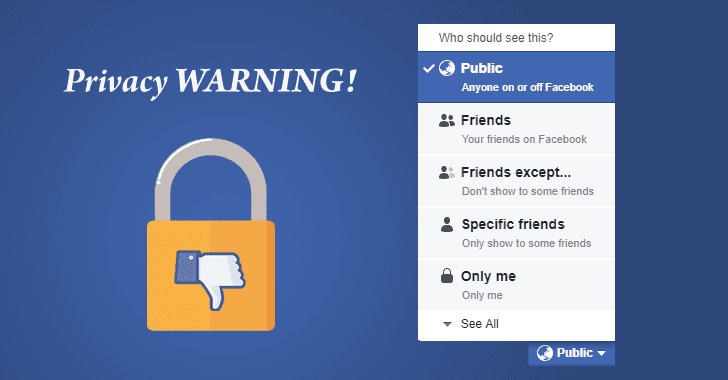Facebook bug changed 14 million users' default privacy settings to public
Facebook admits as many as 14 millions of its users who thought they're sharing content privately with only friends may have inadvertently shared their posts with everyone because of a software bug.
Facebook said in front of Congress in March over the Cambridge Analytica scandal that "every piece of content that you share on Facebook you own, you have complete control over who sees it and how you share it," but the news came out to be another failure of the company to keep the information of millions of users private.
Facebook typically allows users to select the audiences who can see their posts, and that privacy setting remains the default until the user itself manually updates it.
However, the social media giant revealed Thursday that it recently found a bug that automatically updated the default audience setting for 14 million users' Facebook posts to "Public," even if they had intended to share them just with their friends, or a smaller group of people only.
Egan said the Facebook team fixed the bug within 4 days on May 22 and changed the default audience setting back to what it was previously set by the affected users. So, the posts you shared with your friends after May 22 would not be affected.
However, if you have shared content between the affected period, i.e., May 18 to May 22, which went public automatically, the company fixed the privacy settings for those posts by May 27 and is now notifying all affected users.
However, the company claimed the partnerships with over 60 device makers were decade old when there were no apps or app stores and were designed to provide Facebook features on their operating systems.
Facebook said in front of Congress in March over the Cambridge Analytica scandal that "every piece of content that you share on Facebook you own, you have complete control over who sees it and how you share it," but the news came out to be another failure of the company to keep the information of millions of users private.
Facebook typically allows users to select the audiences who can see their posts, and that privacy setting remains the default until the user itself manually updates it.
However, the social media giant revealed Thursday that it recently found a bug that automatically updated the default audience setting for 14 million users' Facebook posts to "Public," even if they had intended to share them just with their friends, or a smaller group of people only.
"We recently discovered a technical error between May 18 and 27 that automatically suggested a public audience when you were creating posts," Facebook's 'Please Review Your Posts' alert sent to affected users reads. "We apologize for this mistake."According to Facebook chief privacy officer Erin Egan, the bug was live for a period of 4 days between May 18 and May 22, which was caused while the company was testing a new feature.
Egan said the Facebook team fixed the bug within 4 days on May 22 and changed the default audience setting back to what it was previously set by the affected users. So, the posts you shared with your friends after May 22 would not be affected.
However, if you have shared content between the affected period, i.e., May 18 to May 22, which went public automatically, the company fixed the privacy settings for those posts by May 27 and is now notifying all affected users.
"We have fixed this issue and starting today we are letting everyone affected know and asking them to review any posts they made during that time," Egan said.
"To be clear, this bug did not impact anything people had posted before—and they could still choose their audience just as they always have. We'd like to apologize for this mistake."Facebook is currently facing criticism from Congress for data sharing partnerships with Chinese companies that had been in place for years.
However, the company claimed the partnerships with over 60 device makers were decade old when there were no apps or app stores and were designed to provide Facebook features on their operating systems.
Have something to say about this article? Comment below or share it with us on Facebook, Twitter or our LinkedIn Group.
